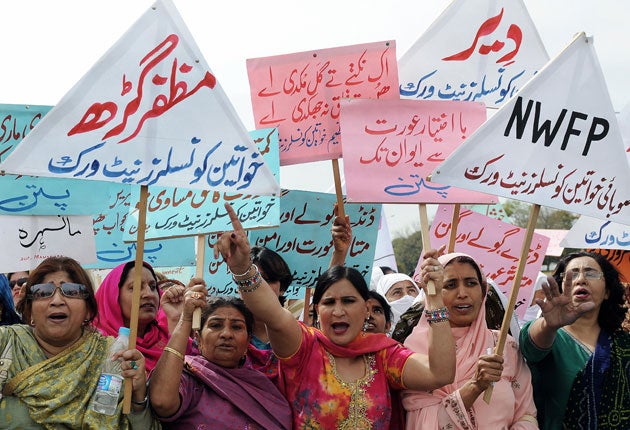Abortion hotline in Pakistan faces violent opposition
Islamic groups and politicians condemn the hotline as 'colonial' and warn organisers they risk reprisals

An abortion hotline which has been set up in Pakistan is facing violent opposition. Islamic groups and political parties have condemned the hotline, which was launched yesterday, as "anti-Islamic" and "colonial", even though it will save the lives of thousands of women who die each year in backstreet abortion clinics. They have warned the organisers that they are at risk of reprisals.
The hotline, set up by a collection of women's groups in Pakistan and the Dutch pro-choice group Women on Waves, advises women how to use a drug to induce miscarriage safely and aims to reduce the estimated 890,000 unsafe illegal abortions performed in Pakistan every year.
"There will be very strong opposition," said Ahsan Iqbal, of the Pakistan Muslim League. "This could create misuse. It cannot be done as free choice under our law and our religion."
Access to abortion in Pakistan is very limited. Forbidden under Islamic law unless the mother's life is in danger, terminating a pregnancy carries a massive social stigma in the country, which is 97 per cent Muslim. As a result, a flourishing trade in backstreet abortion clinics has developed.
Figures from the Population Council of Pakistan show that the country has one of the highest rates of maternal mortality in the world, with 320 women dying for every 100,000 live births – compared to 13 per 100,000 in the UK. The Guttmacher Institute, which researches sexual and reproductive health, estimates that as many as one in six deaths are a result of illegal abortions.
"We want to save women's lives," said Gulalai Ismail, founder of the Pakistani women's group Aware Girls, which is helping to set up the hotline. "We are empowering women, and trying to give them information to help them take control of their bodies. Any groups which try to help women will have problems with extremist and fundamentalist groups. Ninety-nine per cent of clerics will oppose this."
As well as the hotline, trained Pakistani staff will offer abortion information in communities in rural Pakistan, particularly in the tribal areas of the North-West Frontier Province, where opposition is expected to be fiercest.
Massoud Shadjareh, chairman of the Islamic Human Rights Commission, warned the organisers that they risked reprisals. "To go against the majority like this might be seen sympathetically in the West, but it will be counterproductive and will create huge problems. At best, they are misguided, at worst they are trying to provoke," he said. "It is part of the colonial idea that the West's way is the best, and that is not the case."
Women on Waves, created in 1999 by the Dutch physician Rebecca Gomperts, operates a controversial "abortion boat", which offers free terminations in international waters around countries where abortion is illegal or difficult to obtain. In 2004, the ship was prevented from entering Portuguese waters after the government blocked its way with a warship; on another occasion, a flotilla of anti-abortion campaigners surrounded the vessel when it docked in the Spanish port of Valencia, and hundreds of protesters lined the streets. However, there are no plans for it to moor off the coast of Pakistan.
"While the debate continues on whether terminating a pregnancy is allowed or not, and under what conditions, thousands of women are dying as a result of unsafe backstreet abortions," said Shaista Gohir, executive director of Muslim Women's Network. "The Pakistani government is failing in its duty to provide adequate family planning services," she said.
A 2002 survey found that most women seeking abortions were married, aged in their thirties and already had four children. Globally, an estimated 20 million women have illegal abortions every year, around 68,000 of whom die as a result.
Subscribe to Independent Premium to bookmark this article
Want to bookmark your favourite articles and stories to read or reference later? Start your Independent Premium subscription today.

Join our commenting forum
Join thought-provoking conversations, follow other Independent readers and see their replies